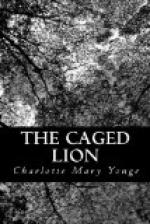‘Ay, my friend and brother, I am Baccalaureus, even as you are,’ eagerly said the young gentleman, in whom Malcolm, somewhat to his alarm, recognized his cousin, James Kennedy, the King’s nephew, a real Parisian ‘bejanus,’ or bec jaune, {2} when they last had met in the Hotel de St. Pol; and thus not only qualified to confute and expose him, should he show any ignorance of details, but also much more likely to know him than those who had not seen him for many months before he had left Scotland.
But James Kennedy asked no questions, only said kindly, in the Latin that was always spoken in the University, ’Pray pardon us! Mores Hyperboreis desunt. {3} The Regent would be grieved, if he knew how these scelerati {4} have sorted you. Come, rest and wash—it will soon be supper-time.’
He took Malcolm to an inner court, filled for him a cup of ale, for his immediate refreshment, and led him to a spout of clear water, in the side of the rock on which the Castle stood; where a stone basin afforded the only facilities for washing that the greater part of the inhabitants of the Castle expected, and, in effect, more than they commonly used. Malcolm, however, was heartily glad of the refreshment of removing the dust from his weary face and feet—and heartily thanked his protector, in the same dog-Latin. Kennedy waited for him, and as a great bell began to ring, said ‘Pro caena,’ {5} and conducted him towards the great hall while Malcolm felt much impelled to make himself known, but was conscious that he had not so comported himself towards his cousin at Paris as to deserve much favour from him.
A high table was spread in the hall, with the usual appliances befitting princes and nobles. The other tables, below the dais, were of the rudest description, and stained with accumulations of grease and ale; and no wonder, since trenchers were not, and each man hacked a gobbet for himself from the huge pieces of beef carried round on spits—nor would the guests have had any objection, during a campaign, to cook the meat in the fashion described by Froissart, between themselves and the saddle. These were the squirearchy; Malcolm’s late persecutors did not aspire to the benches around these boards, or only at second hand, and for the most part had no seat but the unclean straw and rushes that strewed the floor.




